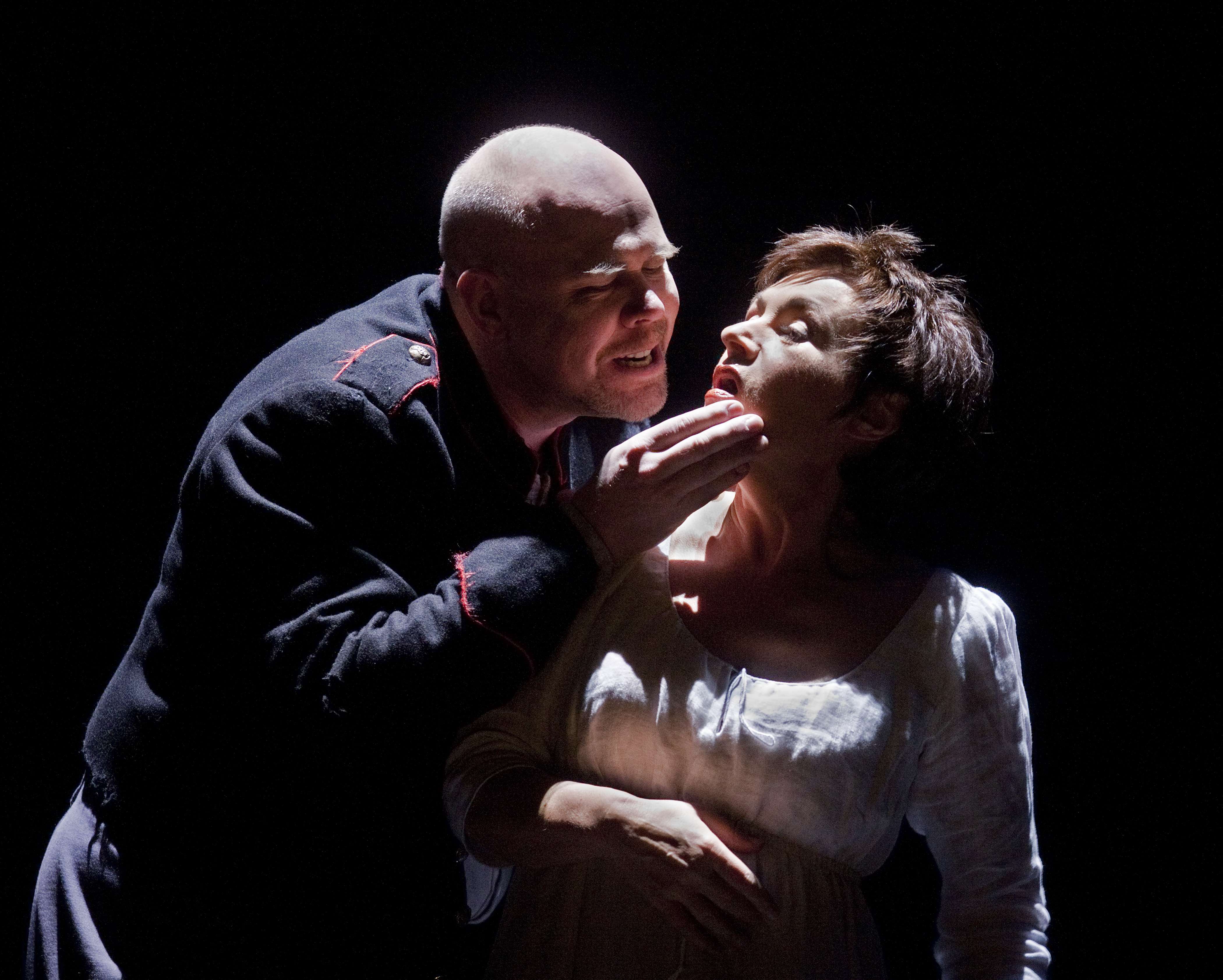|
Back
Torment Transfigured New York
The Metropolitan Opera
04/06/2011 - and April 9, 13, 16*, 2011
Alban Berg: Wozzeck
Alan Held (Wozzeck), Waltraud Meier (Marie), Gerhard Siegel (Captain), Stuart Skelton (Drum Major), Walter Fink (Doctor), Russell Thomas (Andres), Wendy White (Margret), Richard Bernstein (Apprentice), Mark Schowalter (Apprentice), Philippe Castagner (Fool), Daniel Clark Smith (Soldier), Raymond Aparentado (Townsman), John Albert (Child), Jonathan Kelly (Piano Solo)
Metropolitan Opera Orchestra and Chorus, James Levine (Conductor)
Mark Lamos (Production), Robert Israel (Set and Costume Designer), James F. Ingalls (Lighting Designer), Gregory Keller (Stage Director)

A.Held, W. Meier (© Cory Weaver/Metropolitan Opera)
As Maestro Levine’s health problems have continued, he has been forced to prioritize his conducting commitments. After stepping down entirely from his duties with the Boston Symphony Orchestra earlier this spring, he has further whittled down his scheduled appearance with the Metropolitan Opera. But this surely painful process of triage has allowed his true passions to surface. Relinquishing Das Rheingold, which he conducted last fall, and Il Trovatore, he chose to hold on to the premiere of the new production of Die Walküre and a revival of Wozzeck.
James Levine’s deep affection for Berg’s 1925 expressionist masterpiece is demonstrated by his long history with the work. Since 1974, he has led 39 performances of Wozzeck at the Met, plus the four this season.
After being welcomed back to the podium with a sustained and affectionate ovation from the Met audience, Levine drew incredibly detailed textures from the powerful score. He artfully balanced its mixture of gorgeous melody and atonality to highlight the futile struggle for love and life, unrelentingly driving on until all possibility of hope was engulfed in despair and madness. The orchestral postludes were particularly ravishing.
The Berg opera, based on Büchner’s unfinished play, unfolded in 15 rapidly progressing scenes. With no intermission, there was nothing to check the increasing momentum, which hurtled to a seemingly inexorable climax. We could only watch transfixed as Wozzeck, a simple soldier, longing for the unaffordable luxuries of morality and self-respect, had the last vestige of his humanity crushed beneath the heel of an unfeeling society. Even as his being was swallowed up by madness and murder, the legacy of man’s inhumanity to man was passed to the next generation, as the opera concluded with children taunting Wozzeck’s son with his parents’ double tragedy, starting the cycle of cruelty and despair anew.
The grinding feeling of helpless alienation inherent in both Berg’s opera and the Büchner play on which it was based was heightened by many aspects of this brilliant production by Mark Lamos. The absolutely spare set (by Robert Israel) provided no respite for the eye or for the characters inhabiting it. It was all sharp angles, rough walls, grey on grey, cold and comfortless. The stark lighting by James F. Ingalls emphasized the harsh angularity of the set, and created vivid expressionist shadows that in combination with the music almost seemed to draw the oxygen out of the auditorium.
Singing the title role, Alan Held replaced Matthias Goerne, who withdrew from the production for medical reasons. Held debuted at the Met in 1989 as Mr. Redburn in Billy Budd. Since then he has sung more than 190 performances at the Met, including the title role of Wozzeck in the 2005-2006 revival, and all four villains in last season’s Les Contes d'Hoffmann. Held brilliantly embodied the desperate Wozzeck vocally and physically whether he was standing meekly with his arms stiffly at his sides or rushing about the stage as if to outrun his tormentors. With his vacant stare and extraordinarily large and expressive hands, often cradling his face in a manner reminiscent of Munch’s painting, The Scream, Held’s portrayal was heartbreaking. And his voice was perfect for the role. He had power to spare, easily cutting through Berg’s thick orchestration; his diction was superb and his phrasing expressive.
Waltraud Meier has long been identified with Marie, Wozzeck’s lover and the mother of his child, but this run marked her first appearance in this role at the Met. Her portrayal was spell-binding, her voice with a luminous top, her phrasing and diction exemplary. Her hushed and haunting lullaby to her child was a highlight of the performance. Meier’s Marie was filled with guilt over her affair with the Drum Major (Stuart Skelton in an outstanding Met debut). Yet there was great passion between the two.
Gerhart Siegel sang a marvelously meek and victimized Mime in Das Rheingold earlier this season. Here, as the arrogant and clueless Captain, he was simply incapable of understanding the level of deprivation experienced by a poor man such as Wozzeck. Walter Fink gave us an excellent quack doctor, obsessed with his own health but utterly uncaring about his patient and research subject, the gullible Wozzeck. Other members of the strong supporting cast included Russell Thomas as Andres, and the always dependably superb Richard Bernstein and Mark Showalter. (Read here).
Arlene Judith Klotzko
|